Aliens Like You and Me
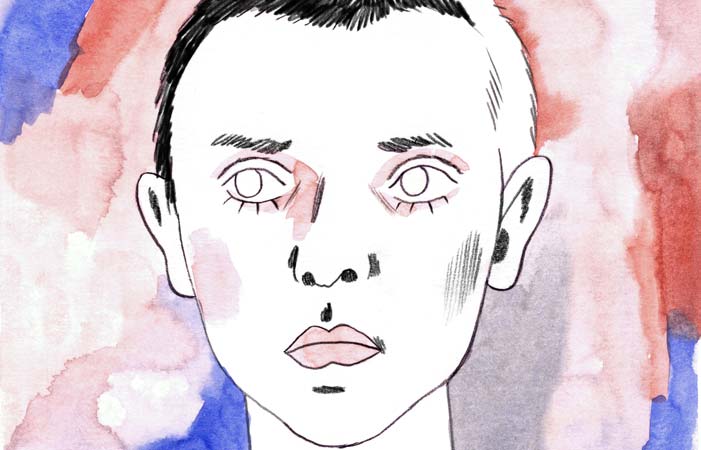 The best thing to come out of summer 2016, and this year’s most promising Halloween theme is Stranger Things, Netflix’s paranormal thriller about a middle-schooler, Will, who goes missing in his tiny American town in 1983. The show is a walking Pinterest board of glorious ’80s film and television references: the puffer vests, the bicycles, the tight-lipped makeouts (onscreen kisses in the ’80s were ~the best~), the nods to E.T., and Stephen King, and the nerdy tween boys out to solve a mystery. But the best best-part of Stranger Things is the character of Eleven (Millie Bobbie Brown), a girl with superpowers and a buzz cut who befriends Mike (Finn Wolfhard), Dustin (Gazen Matazarro), and Lucas (Caleb McLaughlin), Will’s friends.
The best thing to come out of summer 2016, and this year’s most promising Halloween theme is Stranger Things, Netflix’s paranormal thriller about a middle-schooler, Will, who goes missing in his tiny American town in 1983. The show is a walking Pinterest board of glorious ’80s film and television references: the puffer vests, the bicycles, the tight-lipped makeouts (onscreen kisses in the ’80s were ~the best~), the nods to E.T., and Stephen King, and the nerdy tween boys out to solve a mystery. But the best best-part of Stranger Things is the character of Eleven (Millie Bobbie Brown), a girl with superpowers and a buzz cut who befriends Mike (Finn Wolfhard), Dustin (Gazen Matazarro), and Lucas (Caleb McLaughlin), Will’s friends.
Do you know Eleven? This is her, having a less-than stellar childhood: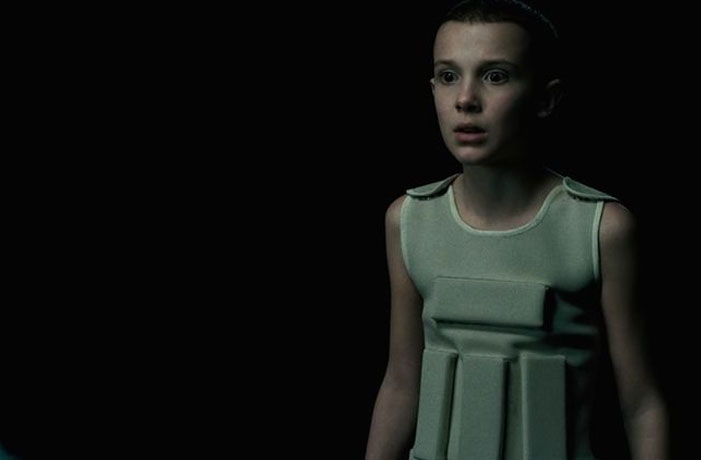
Believe me when I tell you: she is all of us at a certain age.
Eleven has telekinetic powers and a way of reaching the dark, murky world of “the Upside Down” where monsters lurk and Will is trapped. (How? Through a wormhole; physics in the 1980s were also ~the best~.). Although there are clues about her parents, Eleven is ostensibly alone in the world, having escaped a secret military lab where she was experimented on by a man she called “Papa.” Mike and his bicycle gang offer her the first chance to understand friendship, to come to terms with her alien powers, and to, yes, kiss a boy. Buzzfeed’s Shannon Keating sees this as a case of Eleven being “feminized” per retro ’80s tropes—there to serve Mike’s pubescent dreams—but I disagree!
To me, Eleven was a brilliant invention—a girl so alienated by herself she suffered physical fallout every time she experienced the strength of her own power (nose bleeds, fainting); a girl who felt ambivalent about her looks, wondering at points if she was a monster, but who wound up owning her GI Jane hairdo; a girl with the bravery to face her monsters if it meant saving her friends; a girl stranded in the in-between of a tomboyish childhood and age when girls are suddenly viewed and assessed according to their looks/appeal to men.
Eleven is otherworldly, as so many characters written off as MPDG’s have been before her, and yet a perfect stand-in for the anxieties, nightmares, and dreams of teen/tween girls. After all, what is high school, if not a frightening science experiment racked with hasty makeovers, immense hunger for waffles, alienation from your peers, and estrangement from your parents? Eleven is the ultimate embodiment of all our angst because she’s made up of so many good characters from alllll the books you love.
The Aliens, the Outsiders, and the Kooks
Take Leslie in Bridge to Terabithia, a tomboy who doesn’t fit in at school, and doesn’t care to—she’d rather beat the boys at their own races than bother trying to be liked. Her imagination is so much grander than Jess’s (she world-builds with an absolute fury) that when she leaves him, you worry that he won’t be able to reach Terabithia without her.
“She had tricked him. She had made him leave his old self behind and come into her world, and then before he was really at home in it but too late to go back, she had left him stranded there—like an astronaut wandering about on the moon. Alone.” —Katherine Patterson
Was Leslie just a free spirit planted in the novel to enable Jess? I don’t think so. She’s an anomaly, a non-girly girl who isn’t afraid of her own strength and power, and that alienates people. Society is terrified of girls who don’t accept their place.
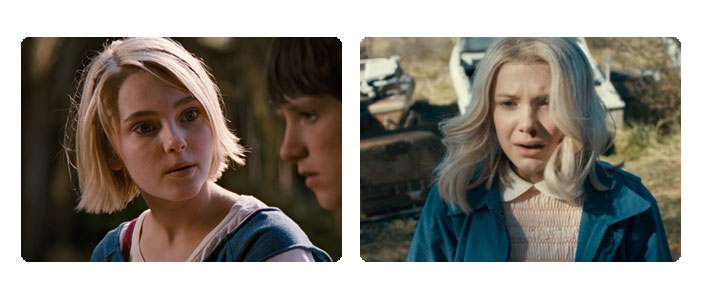
Okay, Anna Sophia-Robb was maybe a *leedle* hot to play the supposed outcast Leslie, but the premise stands.
Eleven plays a similar role for Mike, starting out as a sort of E.T. character he dinks on his bike and hides in a cubby in the basement, but becoming a friend and ally. Eleven’s powers make her valuable to the government, and to the boys in their hunt to reach Will, but Mark’s romantic interest is not self-serving in the same way—he doesn’t view her as a magic crystal, but as a person. (As an example of a character who isn’t given the same layers of complexity, consider Milla Jovovich’s super-hot-alien character in The Fifth Element, whose costume was basically just Smart Tape (spoiler: she was the titular element.))
You know the alien girl from other places, too: Remember Thomas Hardy’s Far From the Madding Crowd, in which Bathsheba Everdene (the inspiration for Katniss) had the nerve to ride a horse non-side-saddle (so strident!), to dismiss male suitors, and run her own business. The men are terrified of Bathsheba and in awe; they line up to propose to her.
John Green tweaked her in the Paper Towns character of Margo Roth Spiegelman who was larger than life, and, it turned out, sick of being fodder for other people’s character arcs. Margo’s outsized beauty and wit set her apart from her peers, and made her “different” enough that she felt displaced from the Orlando development she called home. The success of Margo was in the fact she managed to transcend the pages of the novel altogether; although Q’s pursuit of her clues does lead him to a Margo, the real Margo has, for most of the novel, skipped into a meta, parallel dimension—like Eleven, and like Thanks for the Trouble’s Zelda, she’s bigger than the story she’s housed in.
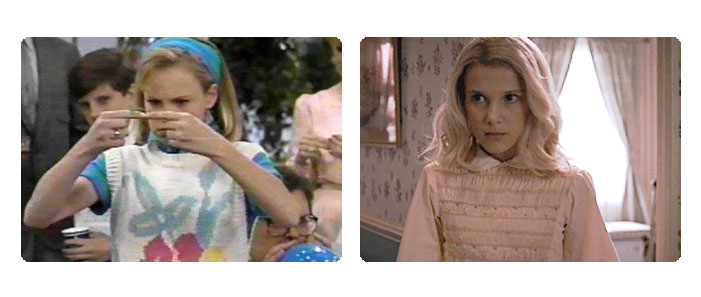
In Out of This World, the hero, Evie, learns she is half-alien, and talks to her dad, alien through a flashing crystal. Evie finds everyday teen stuff challenging, and can freeze time by touching her fingertips. I mean I think we can all relate.
The best teen characters, imo, aren’t the “good” ones, the Chosen ones, but the conflicted kids who realize the heroism and antagonism they are capable of: think junior assassin Arya from Game of Thrones. Another excellent example is Jude from Jandy Nelson’s I’ll Give You the Sun, whose connection to her twin brother Noah plays out with a lightly supernatural tinge. She does something bad, something that hurts her brother, batting about her sexuality self-destructively, and yet she is the only person who can save him. More obviously, you have Estella from Great Expectations, who kneads poor Pip’s heart in her wicked hands, and yet is something a victim herself.
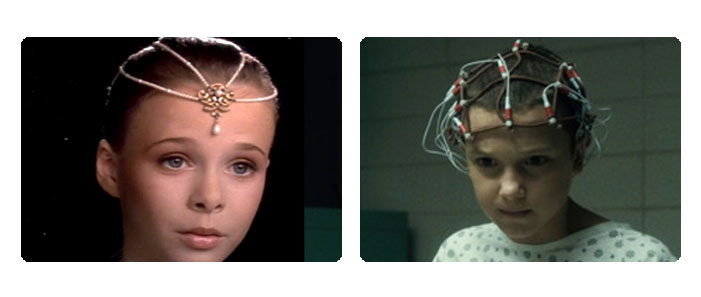 The Childlike Empress from The Never-Ending Story and probable alien.
The Childlike Empress from The Never-Ending Story and probable alien.
There is nothing worse than feeling different than everyone else: any time a teacher would ask me to remain after class, whether to praise or punish me, I would feel that pit of anxiety in my stomach for standing out among my peers. This is the premise of your favorite book about puberty and mine, Are You There God, It’s Me, Margaret. Margaret moves from New York City to the Jersey suburbs and suffers multiple existential crises: she isn’t sure what her religion is, she hasn’t got boobs yet, and she’s waiting for her period—that paranormal Carrie-esque phenomenon that sets girls apart from boys forever. (A fun historical detail is the use of period belts, which, from Judy Blume’s description, were structured a bit like the headgear above^.)
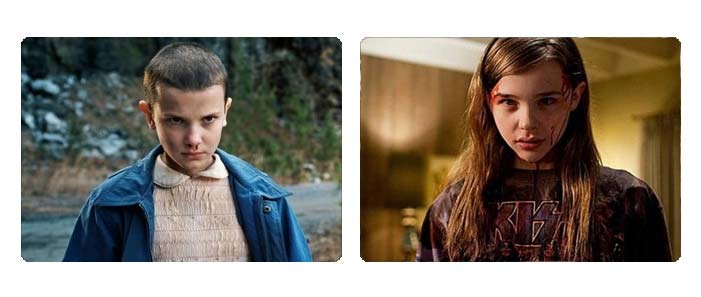
“She did not know if her gift came from the lord of light or of darkness, and now, finally finding that she didn’t care which, she was overcome with almost indescribable relief, as if a huge weight, long carried, had slipped from her shoulders.” —Stephen King, Carrie
And Then There Was Carrie
What all these characters do, along with Eleven, is dismantle the idea of a “normal” girlhood: each complicates the idea of what a girl should be, the moment when one “becomes” a girl, and what a girl is capable of. But no one does this better than Stephen King’s Carrie, the quintessential telekinetic prom queen, whose bloody visage you already know, even if you never read the book. What better single image could there be to capture the fear and distrust society has around teen girls? What better single snapshot of the ways in which girls are demonized for being sluts, or prudes, or mean girls, or teen queens; of the ways they are misunderstood?

And the Othering and misunderstanding of girls brings its own trauma, as BlogHer‘s Deb Rox points out in this excellent piece about Eleven, which is why the moments where she unleashes the full extent of her powers are so cathartic.
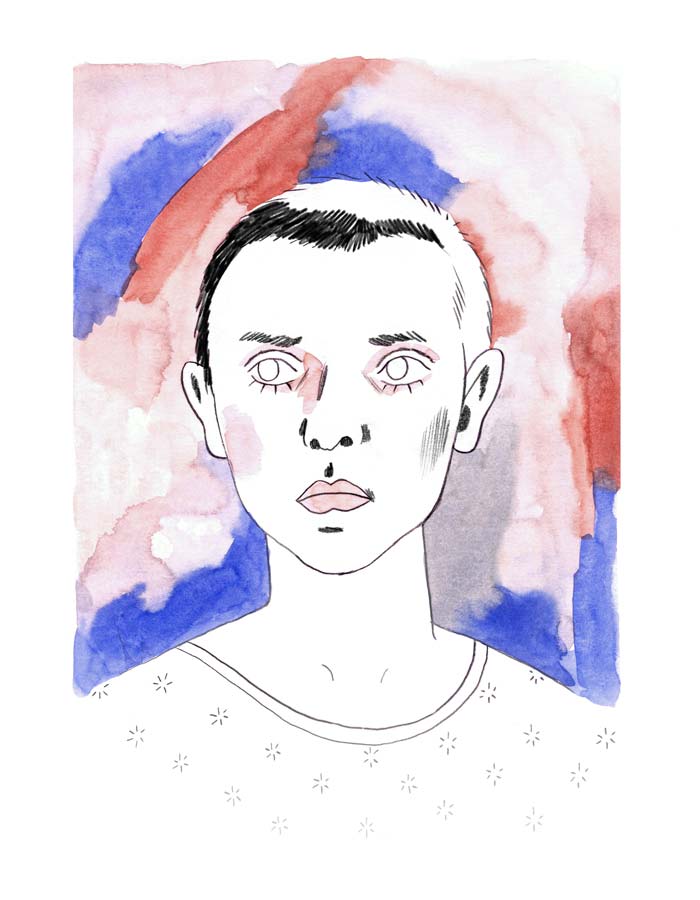
Art by Louise Reimer
While I remember my childhood as being vaguely Stand By Me-ish—biking with my buddies, building forts in the woods, ghost-hunting with ouija boards—my high school years were a study in the alienation you get with Eleven: feeling totally weird in my body, letting the gap between my identity and that of my family yawn a little, suffering from a failure to communicate, and wondering who my real friends were.
What’s so brilliant about Stranger Things is that it gets boys, adults, and conspiracy theorists invested in the emotional life of a pre-teen girl, asking themselves probing questions about who she is, according to the limited clues she gives off.
And aren’t we all as big of a mystery, especially at that age?
Did you watch Stranger Things? Who were some of your favorite tween/teen characters?












